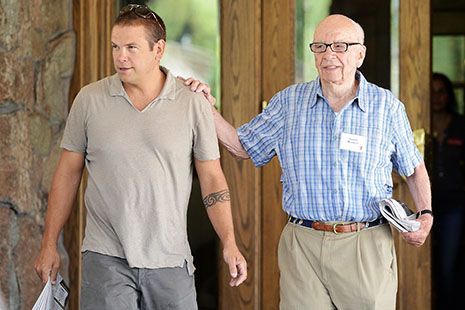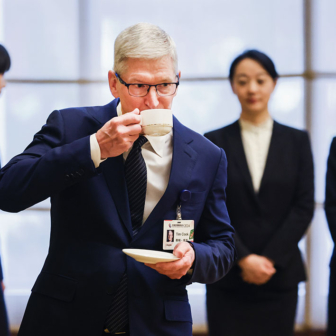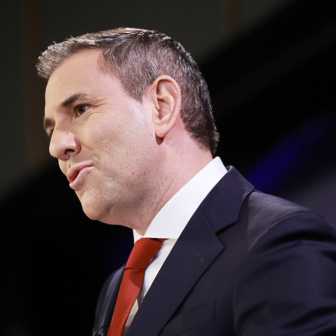WHEN prime minister Tony Abbott reintroduced knights and dames to Australian public life, the decision was met with amusement and derision. But a few days later, when the English-speaking world’s most powerful media mogul did something equally anachronistic, his announcement was treated almost as part of the natural order.
Rupert Murdoch, who six months ago lectured Australia on the need to become an “egalitarian meritocracy,” decreed that the next heads of his public companies would be determined by hereditary succession. His older son Lachlan would now be co-chair of 21st Century Fox and News Corp; his younger son James would be the co-CEO of 21st Century Fox (although he would continue to report to the other, incumbent chief executive, Chase Carey). In both cases, the “co” probably leaves present powers untouched, but it embeds Rupert’s desired succession plan.
Most of the attention was on the family soap opera, especially Lachlan’s willingness to return to the fold. Rupert has always been fixated on a dynastic succession, and Lachlan and James were given positions of authority very early as training for their eventual assumption of the top positions. Rupert told the world in 1998 that Lachlan was the designated heir. “The children selected him. It was their vote,” he assured his shareholders.
In 2005, though, Lachlan left his job as deputy chief operating officer in New York after losing an internal conflict with, among others, Roger Ailes, head of Fox News, and Peter Chernin, the chief operating officer. According to Michael Wolff, the writer who has had more direct access to Murdoch and his entourage than any other over the last decade, “these professional managers had been key players in transforming News Corp from an outsider company into a modern, blue-chip Wall Street darling.” They weren’t at all happy about having to be “attentive and respectful, even subordinate,” to Rupert’s two sons. Wolff says that Chernin took to referring to Lachlan and James as “the cretins.”
“A quiet and methodical rebellion slowly gained traction,” Wolff writes. “Murdoch’s topmost executives, openly ridiculing Lachlan’s inexperience and questioning his competence – and launching a whispering campaign about his partying lifestyle – triangulated Lachlan out of decision-making powers. In 2005 they starkly ignored Lachlan’s wishes regarding a set of key decisions involving the company’s television networks. In essence, they were daring Murdoch to overrule them.” Rupert took their side, and Lachlan resigned. He returned to Sydney and used his family money and connections to carve out his own career.
Ever since that declaration of independence, Rupert has tried to woo him back; now, in true prodigal-son style, Lachlan has consented to be co-chairman in a non-executive role.
Other aspects of the family’s soap operas played a role in the resolution. Some commentators feel that it was only Rupert’s divorce from his third wife Wendi that made Lachlan willing to return. And there has been much media interest in the relationship between the brothers. As Neil Chenoweth wrote in the Australian Financial Review, James was born fifteen months after Lachlan and has spent a lifetime trying to bridge the gap. According to Wolff, “the brothers openly squabbled and struggled to have the last word” at board meetings, to the embarrassment of other members. Again according to Wolff, after the phone-hacking scandal blew up in London in July 2011, Lachlan and his sister Elisabeth “were hardly speaking to their father and were completely severed from James.” At the Edinburgh television festival in 2012, Elisabeth gave the keynote speech, as James had done a few years earlier, and deliberately and explicitly distanced herself from her brother’s views – so much so, according to Chenoweth, that Rupert refused to speak to her for nine weeks.
In non-Murdoch publications, there was also discussion of the business achievements that qualify Lachlan and James for these high positions. Lachlan has had two major successes. His investment in the online real estate company, the REA Group, has been wildly successful, while his purchase of the Nova radio network has also been profitable.
His failures, though, have been just as spectacular. The first was his involvement in News Limited’s failed attempt to seize control of Australian rugby league through the Super League breakaway movement of the mid-1990s. The cost of this is often put at $500 million, but the flow-on effects – it allowed Packer to have a quarter share of Foxtel and a half share of Fox Sports, and News Limited’s part ownership of rugby league created ongoing complications – may be considerably greater.
Second was his involvement, with James Packer and Jodee Rich, in the spectacular demise of One.Tel, which cost News more than $400 million. Chenoweth provides a devastating extract from Lachlan’s 2005 testimony in the NSW Supreme Court about the company’s collapse, in which Lachlan is unable to remember anything whatsoever about a series of key transactions even when prompted by documentary evidence that showed he was involved.
The last was his investment in Channel Ten. In November 2010, he bought in at $1.37; shares are now selling at 27 cents. According to Chenoweth, the $167 million Lachlan invested in Ten is now worth $66 million. Ten has recently recorded its worst ever prime-time ratings performance, and the network is worth around a billion dollars less than when Lachlan began his investment.
Like his brother, James has been credited with some successes. His time as head of Star TV in Asia is judged a success, as is his drive for a full News Corp takeover of the British satellite broadcaster BSkyB from its current 39 per cent. But he went on a buying spree in Asia and among internet companies, at Rupert’s direction, in the late 1990s, with abysmal returns. Within a year or two, the losses probably totalled in the hundreds of millions. James’s single worst buy by far was the US$9 billion merger of TV Guide and Gemstar International, which eventually cost News Corp $6 billion.
Overshadowing all other aspects of James’s corporate career, though, is the phone-hacking scandal. According to his own testimony – which conflicts with testimony given by a number of other News International executives – James showed no curiosity about why such an unprecedented and expensive payout was due in a key civil case, and failed to read material given to him by his senior employees.
Lachlan and James may not be the “cretins” of Chernin’s reckoning, but if their names were Lachlan and James Smith their achievements would not be thought to remotely qualify them for the roles they have just been given.
RUPERT’s determination to control the company from beyond the grave is clear. But his ability to do so depends on at least three problematic assumptions. The first is the unity of his own family. The Murdoch Family Trust, set up during Rupert’s divorce from Anna, divided the family’s shares and votes equally among the four children from his first two marriages. After Murdoch had two more daughters with his third wife Wendi, he persuaded his four adult children to allow their stepsisters equal shares of the income, but without any voting rights. For the adult children, the deal came with an immediate sweetener of $150 million in cash and shares.
It will be these four – Prudence, Elisabeth, Lachlan and James – who will be making the decisions. According to Wolff, the Family Trust has no tie-breaking mechanism. It is hard to know, from the outside, the degree to which their reported conflicts are normal sibling rivalry, and how deeply antagonisms run. Nevertheless their unity can’t necessarily be taken for granted. Perhaps even the unthinkable might happen and the females might make a stand for equality of the sexes.
The second assumption involves the strategic role of Prince Alwaleed bin Talal. The Murdochs control around 39 per cent of the voting shares. The stability of their control has rested on their close alliance with the second-largest holder of voting shares, the prince, who holds almost 7 per cent.
Alwaleed – a member of the Saudi royal family, a nephew of King Abdullah and grandson of King Abdulaziz – is unlikely to be hostile to Murdoch’s belief in hereditary prerogatives. He has been ranked the twenty-sixth richest man in the world, and was dubbed the most influential Arab in the world by a Saudi business magazine. He is one of the largest shareholders in Citigroup, and his business interests include several prestigious hotels including London’s Savoy. Fresh flowers are flown from the Netherlands to his Saudi palace each week, and he was the first private individual in the world to own an A380 airplane. He was the focus of some controversy in 2012 when it was reported – only to be denied by Alwaleed – that a “dwarf-throwing” competition had been held at his palace.
Alwaleed has been associated with Murdoch for just over two decades, and in public he has almost invariably endorsed his activities. On one occasion, he was quoted professing reservations about the anti-Islamic bias on Murdoch’s American Fox News, and in July 2011, at the height of the British phone-hacking scandal, he said Rebekah Brooks should resign. (She did so the next day, although the decision that Brooks should do so had already been taken before his statement.) At the same time, Alwaleed described James Murdoch as “a highly ethical, professional, decent man.”
Rupert Murdoch has also been a partner in Alwaleed’s media business in the Arab world. If he became a less uncritical partner of the Murdoch family, however, it would make their control considerably more difficult.
Murdoch’s third assumption about the future is the most important and most fraught. He is assuming that his successors will be able to dominate the shareholders the way he has. Rupert, however, has the unique authority that comes from having built the company from a relatively small one into a corporate giant. His successors will never have that status, and it is almost certain that the spectacular corporate growth under Rupert will not be repeated.
Murdoch shareholding amounts to only around 14 per cent of the total. He has maintained control by having two classes of shares – those that have voting rights and those that don’t. This is not a unique arrangement, and those who bought the non-voting shares knew what they were doing. Nevertheless it runs counter to the essential principle of the stock exchange that influence over a company should be in proportion to the funds invested in it.
In 2011, the Economist and several other analysts judged that the interests of the family and those of the firm were diverging. The evidence for that view had been steadily accumulating.
In 2004, as the company moved its headquarters from Australia to Delaware, John Malone, one of the toughest American media operators, had picked up around 19 per cent of the voting stock, making him the second-largest owner after Murdoch. Murdoch was alarmed by this incursion, and in December 2006 made a desperate move to get Malone off his share register. The two made a deal whose essence was that Malone gave up his shares in return for ownership of the US satellite broadcaster DirecTV.
Murdoch had always said that winning control of DirecTV would be “a company-transforming deal.” For six years, it was his major priority, and finally, in 2003, after many setbacks and a long lawsuit, he achieved his goal. It was, he declared, the absolute, necessary synthesis of all that he’d worked for.
But three years later, he gave Malone a good deal on the company in order to get rid of him. Malone came out of it better than other News Corp shareholders. In the years since, DirecTV has been a great success. Its revenue grew from $14.8 billion in 2006 to $27.2 billion in 2011; its subscriber base went from sixteen million to twenty million; and its operating profit margin has stayed around 15 per cent. Assuming that News could have managed DirecTV as well as Malone did, News Corp shareholders were denied a growing and lucrative revenue stream. Moreover, it was a business that fitted perfectly into the company’s larger strategies alongside BSkyB, Star and Foxtel pay TV distribution platforms. The deal had been in Murdoch’s interests, not the shareholders’.
Sentiment is gathering among many shareholders, especially institutional investors, as a result of manoeuvres such as this, as well as the fall-out from the British scandals. So far, Murdoch has relied on the crude voting arithmetic to maintain control. But this does not mean that he, let alone his successors, can be immune from shareholder sentiment.
YEARS AFTER the event, Murdoch told Michael Wolff that siding with his American executives against Lachlan in 2005 was one of his worst decisions. But in reality he had few options. If it had come to a showdown and his most capable managers left, leaving Lachlan in charge, the share price would have plummeted.
And if there is a future crisis of investor confidence it will put the company board under pressure. Part of the Rupert model was a board that would do his bidding. Peter Gladwin, a long-serving London editor, said that he was made a director “simply to agree with whatever Rupert wanted.” As the New York Times’s David Carr wrote, “Being a board member of News Corp is not a bad gig; it pays over $200,000 a year and requires lifting nothing heavier than a rubber stamp.” After the phone-hacking scandals, the supine behaviour of the Board came under criticism and became part of the reason why the monitoring group Governance Metrics International gave News Corp its lowest rating for “environment, social and governance,” F, placing it in the bottom 5 per cent of the 5400 corporations it examined.
This passivity was on display even in the recent appointments. On 24 March, Murdoch convened a conference call to make Lachlan’s return official. As Chenoweth commented, “succession planning for the CEO and the Chairman is the most critical role a board has, and they did it with a conference call two days before it was announced?” How will this group cope with a future conflict between chairman Lachlan and chief executive James?
Absolute monarchies tend to collapse, and for predictable reasons. The monarch places his or her interest above the public interest. Hierarchical court relations, without the checks and balances of contested authority, tend to lead to incompetent decision-making. Succession becomes a problem.
The one-man rule that Rupert has cultivated has already caused his companies problems. Despite his best efforts to make it otherwise, his passing may force their corporate governance into the twenty-first century. •




